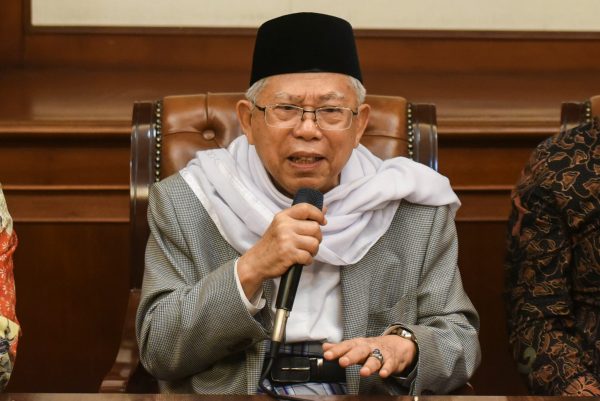The coming together of the duo reflects the symbiosis of the two main streams of Indonesian politics — nationalism as manifested in Jokowi and Islam in Amin.
A central feature of Amin’s campaign so far is his promotion of Wasatiyyah Islam. Loosely translated, the term wasatiyyah connotes a middle way or a path of moderation. During an October 2018 speech in Singapore hosted by the S Rajaratnam School of International Studies (RSIS), Amin spoke of the importance of Wasatiyyah Islam in Indonesia, and how Indonesia should not only practise but also project Wasatiyyah Islam to the world. To him, Wasatiyyah Islam contributes not only to peace and security in Indonesia, but also globally given the country’s position as the world’s fourth largest country by population.
So what is Wasatiyyah Islam? According to Amin: ‘It is Islam tengah (middle way or centrist Islam) that produces the best community (khairu ummah)’. Islam tengah is anchored in at least six core characteristics: tawassuth (the middle way), tawazun (balance), tasamuh (tolerance), musawah (egalitarianism and non-discrimination), musyawarah dan muakafat (consultation and consensus) and islah (reformism).
Wasatiyyah Islam is not really new to Indonesia. It has always been part and parcel of Indonesian life and was the driving spirit behind the strategic compromise between political Islam and nationalism that became the ideological basis of the Indonesian nation-state at its founding in 1945.
Nahdlahtul Ulama, Indonesia’s largest Islamic organisation that Amin led as the rais ‘aam (supreme leader) until his nomination as vice-presidential candidate, has played a key role in this ideological compromise since Indonesia’s founding. Over this period, the relationship between political Islam and the state in Indonesia has gone through a series of ups and downs in a process marked by a mix of latent tension and mutual accommodation.
Speaking on the contemporary dynamic of this relationship, Amin remarked: ‘The commitment to Wasatiyyah Islam in Indonesia in recent years is a reaffirmation of Islamic moderation as the conviction of mainstream Muslims in Indonesia. This is an important response to the strengthening consolidation in recent years of extremism in the name of Islam, be it from the left or from the right’.
The Indonesian Ulema Council, of which Amin is chairman, adopted Wasatiyyah Islam as its devotional paradigm in a national convention in August 2015. This was a year after the so-called Islamic State (IS) came into existence in Syria and violently campaigned to establish a caliphate (an Islamic political paradigm that predates the Westphalian idea of the nation-state).
Before IS, Indonesia had already seen the emergence of the caliphate ideology through Indonesian cells of transnational organisations like the non-violent but ultraconservative Hizb ut-Tahrir (banned in Indonesia in mid-2017) and the militant Jemaah Islamiyah. And in the earlier years of Indonesian independence there was the Darul Islam movement, which morphed into the Indonesian Islamic State movement.
All of these groups share one thing in common: a push for the maximum accommodation of political Islam in the Indonesian state. According to Amin, what Indonesia needed to establish at independence — and what it continues to maintain today — was a nation based on a consensus among all elements of society. This was achieved through the national ideology of Pancasila and the 1945 constitution, both of which remain in operation.
With Indonesia’s strategic position in the Muslim world, and in Southeast Asia in particular, Amin’s push for Wasatiyyah Islam bears implications for the region — especially should his views become national policy if he is elected as vice president. Amin argues for the globalisation of middle way Islam: ‘Given its importance, Wasatiyyah Islam must not be seen to be exclusive to Indonesia. Wasatiyyah Islam can also be used to foster harmony and stability of the Southeast Asian region’. In May 2018, Indonesia hosted a high-level consultation of world Muslim scholars on Wasatiyyah Islam.
Philosophically, the tenets of Wasatiyyah Islam have long been a part of mainstream Islam in other Southeast Asian countries. Under three previous administrations in Malaysia, Islamic moderation was the clarion call and practised policy. In his first tenure as prime minister from 1981 to 2003, Mahathir Mohamad consistently advocated Islamic moderation. His successors followed through with such ideas as Islam Hadhari (Civilisational Islam) and Wasatiyyah Islam too, leading to the formation of the Wasatiyyah Institute Malaysia. As in Indonesia, the Institute was a Malaysian response to rising extremism in some sections of the Muslim community and was to be a platform to promote moderation in the practice of Islam.
Wasatiyyah Islam is also a key characteristic of Islam as practised in Singapore, a multi-religious and multicultural society where Muslims are a significant minority. Moderation, balance and the middle way are the three Islamic principles that guide Singapore’s Muslim community. Wasatiyyah Islam as popularised in Indonesia and Malaysia is, in short, something very much familiar with Singapore’s Muslims.
Southeast Asia’s Muslim community as a whole is going through a phase of adjustment and response to the twin phenomena of religious extremism and religious liberalism. It remains to be seen whether this response will lead to the wider reaffirmation of the Wasatiyyah doctrine of middle way Islam, an approach more nuanced than just ‘moderation’.
Yang Razali Kassim is Senior Fellow with the S Rajaratnam School of International Studies (RSIS), Nanyang Technological University (NTU), Singapore.
An earlier version of this article appeared here on RSIS.

